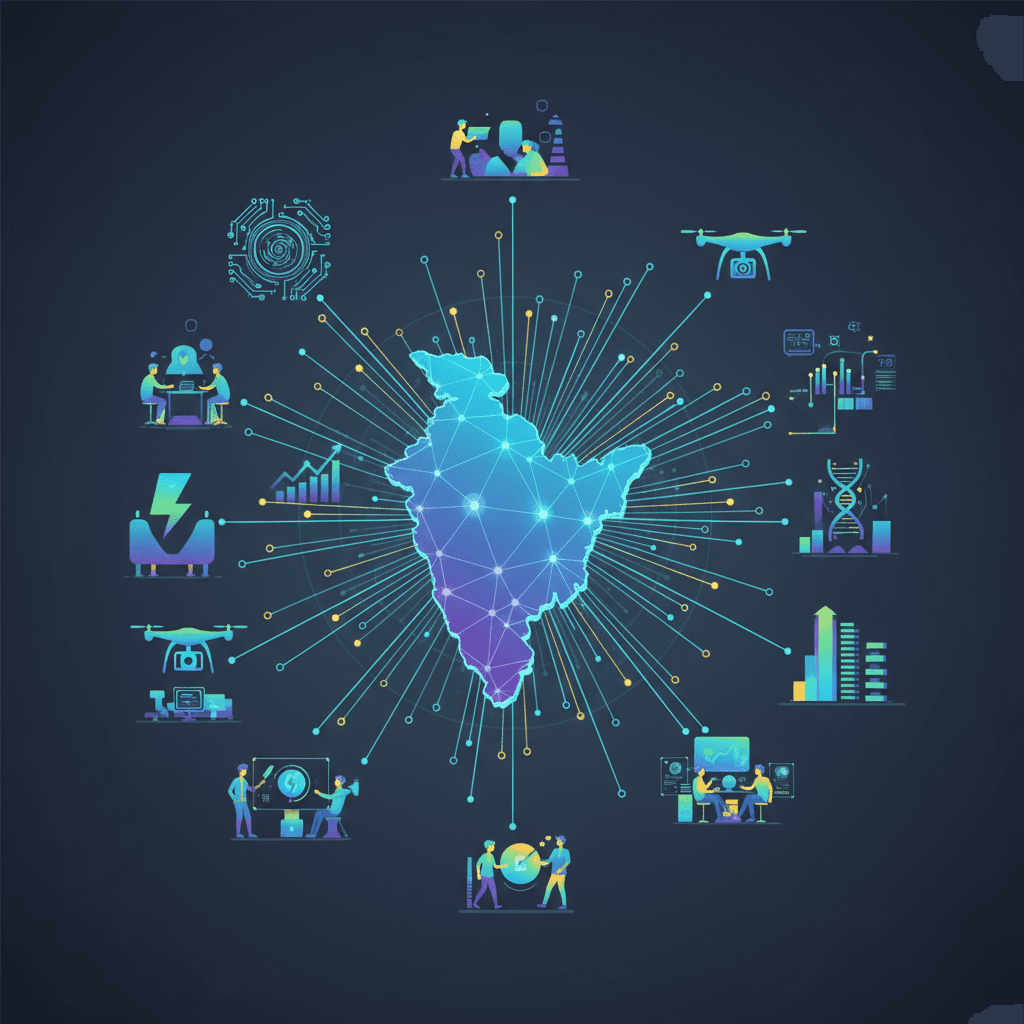Karnataka propels deep-tech and AI with massive ₹2,600 Cr investment.
₹2,600 Cr deep-tech investment, coupled with strategic skilling and regional growth, bolsters Karnataka's global tech leadership.
November 19, 2025

In a significant move to bolster its position as a global technology hub, the government of Karnataka has announced a massive infusion of ₹2,600 crore in fresh investments across several deep-tech sectors. Unveiled at the Bengaluru Tech Summit 2025, these initiatives are coupled with strategic skilling partnerships designed to create a future-ready workforce. The new projects, spanning critical areas like semiconductors, drone technology, electric vehicle (EV) systems, and biotechnology, are expected to generate approximately 3,500 direct and indirect jobs, providing a major impetus to the state's economy and its burgeoning artificial intelligence landscape.[1][2][3][4] This dual focus on capital investment and human resource development signals a deliberate strategy to not only attract cutting-edge industries but also to cultivate the specialized talent required to sustain them, ensuring Karnataka's continued leadership in the next wave of technological innovation.
The cornerstone of the announcement is the signing of six new letters of intent (LoIs) with leading enterprises.[1][4] A standout commitment comes from Global HDI, which will invest ₹1,500 crore to establish a multi-layer PCB manufacturing plant in Tumakuru, a project anticipated to create 1,000 jobs and significantly enhance India's electronics manufacturing capabilities.[1] Further strengthening the electronics ecosystem, Elleve Solutions is set to invest ₹250 crore in a PCB and electronics manufacturing unit.[1] The state’s ambitions in the electric mobility sector received a boost with TSUYO Manufacturing signing an LoI for a ₹250 crore EV powertrain facility in Dharwad, which is projected to generate 700 jobs.[1] In the emerging drone sector, the Drone Federation of India has committed to establishing a 20-acre drone testing facility in Chintamani, with an investment outlay between ₹25 crore and ₹100 crore, a move expected to create over 500 jobs in research, development, and manufacturing.[1][4] The deep-tech push also extends to critical minerals and biotechnology, with MiniMines Cleantech Solutions planning a ₹350 crore mineral refining facility and Eyestem Research committing ₹130 crore to a cell therapy and R&D manufacturing facility focused on vision restoration.[1][3]
Recognizing that a skilled workforce is paramount to the success of these high-tech ventures, Karnataka has simultaneously launched several targeted skilling initiatives. A key partnership involves an MoU between Marvell Semiconductor and the Electronics Sector Skills Council of India (ESSCI) to train 90 women in VLSI design and embedded systems.[1][3][5] This program, fully sponsored by Marvell, will be delivered in Tier 2 and Tier 3 cities and integrated with graduation-level courses, addressing both gender diversity and the geographic spread of opportunities.[1][6] In a broader effort, the government has launched the 'Nipuna Karnataka' initiative, a mission to train 4,000 young people in high-demand fields such as AI, cybersecurity, and data science.[1][7][6] The first phase of this program is expected to unlock access to 2,800 job opportunities with corporate partners including Capgemini, Wells Fargo, and Standard Chartered, ensuring that training is directly linked to industry needs.[1][8] These skilling programs are crucial for developing the talent pipeline needed to support the state's growing AI and deep-tech sectors, as highlighted in the Bengaluru Innovation Report which ranks the city as the world's fifth-largest AI hub.[1]
These announcements are integral to Karnataka's wider strategic vision of decentralizing economic growth and fostering innovation beyond the confines of Bengaluru.[1][7] The investments and skilling programs fall under the umbrella of the Local Economy Accelerator Programme (LEAP), a five-year, ₹1,000 crore initiative designed to strengthen emerging tech clusters across the state with improved infrastructure, funding, and sector-specific support.[1][3][8] IT Minister Priyank Kharge emphasized that this approach aims to "decentralise opportunities and strengthen the innovation network."[1][7] As part of LEAP, two new flagship programs were announced: 'Elevate Next' and 'Elevate Beyond Bengaluru'.[6][8] Starting in early 2026, 'Elevate Next' will offer grants ranging from ₹50 lakh to ₹1 crore to 40 startups in deep-tech, while 'Elevate Beyond Bengaluru' will provide grants up to ₹50 lakh to 50 startups in other parts of the state.[1][6] This structured financial support for early-stage companies is a clear indicator of the government's commitment to nurturing a geographically diverse and robust startup ecosystem capable of driving the next phase of tech-led growth.
In conclusion, Karnataka's latest commitment of ₹2,600 crore and its focused skilling partnerships represent a comprehensive and forward-looking strategy. By attracting substantial investments in high-growth, deep-tech domains and concurrently building a specialized talent pool, the state is reinforcing its industrial and technological base. The deliberate policy to push development into Tier 2 and Tier 3 cities through programs like LEAP addresses regional imbalances and broadens the base of innovation. For the AI industry, these initiatives are particularly significant, as they promise a steady flow of skilled professionals in AI, data science, and semiconductor design—the very foundations of the modern technology stack. This holistic approach of linking investment with talent development and regional growth ensures that Karnataka is not just participating in the global tech race but is actively shaping its future, solidifying its reputation as a premier destination for technology and innovation.